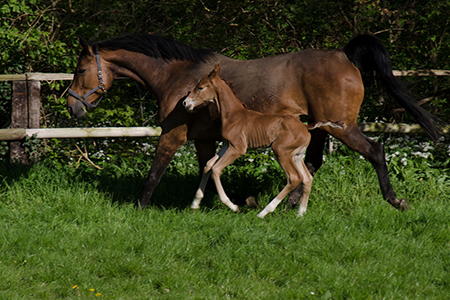
Photo courtesy of F. Lindenberg
The diet's effects were scientifically demonstrated by Industrial PhD Student Frederikke Lindenberg, DVM, whose PhD project was a joint venture and collaboration between Brogaarden and University of Copenhagen, Denmark. Perhaps surprisingly, but very elegantly — a gnotobiotic mouse model was utilized to substantiate the immunological effects of the diet.
Studies of the horse microbiota in relation to the immune system and risk of disease are sparse, but Dr. Lindenberg went a long way to establish the knowledge needed to develop the prebiotic diet. By thoroughly characterizing the microbiota and immune system of slaughter horses, she identified bacteria that correlated with regulatory immune parameters such as FOXP3 and IL-10.
Given a bacterial target to induce regulatory immunity, Dr. Lindenberg established the optimal time window for modulating the microbiota of foals. It turned out to be within the first 50 days of life, as she found that later in life the microbiome was more resilient to perturbations.
Lastly, by feeding the prebiotic diet containing oligosaccharides to pregnant mares and their foals, the collaborators showed that foals consuming the diet had increased levels of the beneficial bacteria.
As it is the case for many human studies, it was not possible to study terminal tissue samples or even biopsies from the foals. To study the immune reaction, Dr. Lindenberg therefore transferred the microbiota from control foals and foals on the prebiotic diet to gnotobiotic mice. Intriguingly, she found that mice having the prebiotic-fed microbiota also had a better regulatory immunity, as indicated by increased expression of il10. These results indicated that foals fed the prebiotic diet harbored a microbiota composition inducing regulatory immunity.
With the enormous focus on utilizing the potential of the microbiome in animal health and production, it is interesting to see that mouse models may be useful in the early research and development for substantiating some of the host-microbiota effects that can be challenging to study directly in the target species.
The scientific results behind the new diet for foals are pending publication. Until then, you can read more about the studies and the diet.















.jpg)

.jpg)
.jpg)
.jpg)
.jpg)





.jpg)


.jpg)
.jpg)

.jpg)


.jpg)





.jpg)

.jpg)





